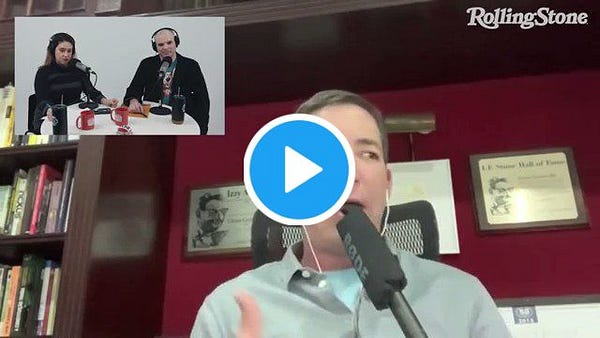The Aftermath Of My Move Back To Independent Journalism
Interviews Discussing My Departure, Media Culture, the Need For Trans-Ideological Dialogue, and Intelligence Community Propaganda
The last twenty-hours have been exhilarating. I had no idea what to expect when I decided to leave The Intercept and move my journalism here, but the outpouring of support — both words of encouragement from readers and those subscribing and supporting my work here — has been beyond what I can describe and it is incredibly gratifying and appreciated. Thank you to everyone who has subscribed and reached out.
This morning I discussed various aspects of my resignation from The Intercept on the outstanding YouTube program Rising with Krystal Ball and Saagar Enjeti. We discussed more in-depth my rationale for leaving, my response to various criticism and accusations from former colleagues and other assorted journalists, why I speak to both conservative and liberal media outlets, and what this episode reflects about broader media pathologies:
Last night, I was on with Tucker Carlson to discuss not only the reporting of mine that was censored, but also the severe acceleration of intelligence community propaganda and interference in our domestic politics and the increasingly restrictive media and political climate:
My appearances on Tucker Carlson’s programs typically provoke some controversy and even consternation among some of my long-term readers on the left. In addition to discussing my rationale for doing so in that above Rising interview, I also explained my reasoning on the Rolling Stone podcast “Useful Idiots” with Matt Taibbi and Katie Halper. Those interested can hear part of my answer in these two short clips:




Finally, for those who did not see it, I appeared earlier this week, for the first time, on Joe Rogan’s program. It was an extraordinary three-hour discussion that covered a very wide range of topics, from my experience in reporting on the Snowden story and our exposés last year in Brazil, the state of free speech generally in the U.S. and in journalism, regulation of our discourse by unaccountable Silicon Valley overlords, the 2020 election, the need for dialogue across partisan and ideological lines, and a great deal of personal introspection and examination. Having done the show, I understand much more why he has built up such a massive and loyal audience. It is very worth thinking about why that has happened and what it says about what is missing from our media ecosystem (we discussed that as well):
The last twenty-four hours have been intense, exciting, draining and so energizing — not just for me but for my family as well. The predictable attacks from journalists trapped in repressive institutions were easily endured as a result of the far more organic and principled support I received. I am very enthusiastic about what is possible on this platform and the journalism it will enable. And I want to thank all of you again with great sincerity and gratitude for making the launch of this platform so successful, and for making my resolve and determination to deliver honest, unique and impactful journalism and commentary higher than it has been in quite a long time.


Glenn - our politics are diametrically opposed, but there is absolutely no other person I trust more than you to provide an honest assessment of the deep undercurrents shaping our world through the media, government and other cultural institutions. I first started reading your Salon articles as a young man, and you have easily been one of the most influential figures in my formative years. I can’t tell you how happy it makes me to see you drop the yoke that the Intercept has become. As a lawyer now at a large New York law firm mirroring your earlier path in life, I can only hope to one day contribute one iota of the good you have provided to this world. Stay true, you have many people that look to you for strength.
What some of your "peers" fail to realize is that you built your entire career taking principled stances that put you on the outside of popular opinion and acceptable dialogue among the "mainstream" corporate journalists. You were in this position during the Bush years, the Obama years, and now it's no different. Those of us who have always appreciated your willingness to speak for the voiceless, no matter how unpopular it may be, will always be behind you even if it takes everyone else time to eventually catch up.